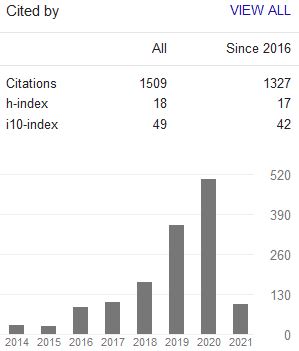CAN THE MUSLIM WORLD BORROW FROM INDONESIAN CONSTITUTIONAL REFORM? A Comparative Constitutional Approach
Abstract
Keywords
Full Text:
PDFReferences
Abrahamson, Shirley S. and Michael J. Fischer. All the World’s a Courtroom: Judging in the New Millennium. 26 Hofstra L. Rev. 273, 1997.
Ackerman, Bruce. The Rise of World Constitutionalism. 83 Va. L. Rev. 771, 1997.
Adiwijoyo, Suwarno. Amandemen UUD 1945. Jakarta: Intermasa, 2000.
Alrasid, Harun. Naskah UUD 1945 Sesudah Tiga Kali Diubah oleh MPR. Jakarta: UI Press, 2002.
Asshiddiqie, Jimly. “Telaah Akademis atas Perubahan UUD 1945”, in Jurnal Demokrasi and HAM, 17, 2001.
Atiyah, P.S. & R.S. Summers. Form and Substance in Anglo-American Law: A Comparative Study in Legal Reasoning, Legal Theory and Legal Institutions, 1987.
Beatty, David M. The Forms and Limits of Constitutional Interpretation, 49 Am. J. Comp. L. 79. 2001.
Baderin, Mashood A. International Human Rights and Islamic Law. Oxford: Oxford University Press, 2003.
Bell, Gary F. “Obstacles to Reform The 1945 Constitution-Constitutions do not Perform Miracles” Van Zorge Report on Indonesia-Commentary and Analysis on Indonesian Politics and Economics; Vol. III, No. 6, 2001.
Beyer, Peter. Religion and Globalization. London: Sage Publication Ltd., 1994.
Boyle, Kevin and Adel Omar Sherif (eds.). Human Rights and Democracy: the Role of the Supreme Constitutional Court of Egypt. London: Kluwer Law International, 1996.
Choudhry, Sujit. Globalization in Search of Justification: Toward a Theory of Comparative Constitutional Interpretation, 74 Ind. L.J. 819. 1999.
Dorf, Michael C. and Barry Friedman. Shared Constitutional Interpretation, Sup. Ct. Rev, 61, 2000.
Estiko, Didit Hariadi (ed.). Amandemen UUD 1945 dan Implikasinya terhadap Pembangunan Sistem Hukum Nasional. Jakarta: Tim Hukum Pusat Pengkajian dan Pelayanan Informasi Sekretariat Jenderal DPR-RI, 2001.
Ewald, William. The Jurisprudential Approach to Comparative Law: A Field Guide to ‘Rats, 46 Am. J. Comp. L, 701, 1998.
Fontana, David. Refined Comparativism in Constitutional Law, 49 UCLA L. Rev, 539, 2001.
Gonggong, Anhar. Amandemen Konstitusi, Otonomi Daerah, dan Fede-ralisme: Solusi untuk Masa Depan. Yogyakarta: Media Presindo, 2001.
Glenn, H. Patrick. “The Capture, Reconstruction and Marginalization of ‘Custom’”, American Journal of Comparative Law, 613, 1997.
----------. Legal Traditions of the World. New York: Oxford University Press, 2000.
Hassal, Graham and Cheryl Saunders. Asia-Pacific Constitutional Systems. Cambridge: Cambridge University Press, 2002.
Hosen, Nadirsyah. Sharia and Constitutional Reform in Indonesia. Singapore: ISEAS, 2007.
----------. “Human Rights Provisions in the Second Amendment to the Indonesian Constitution from Syari`ah Perspective”, The Muslim World, Vol. 97, No. 2, April 2007.
----------. “Religion and the Indonesian Constitution: A Recent Debate”, Journal of Southeast Asian Studies, 36 (3), 2005.
----------. “Constitutionalism and Shari'a”, Murdoch University Electronic Journal of Law, 11 (1), 2004.
International Crisis Group (ICG). Iraq’s Constitutional Challenge, Baghdad and Brussels, ICG Middle East Report No. 19, 13 November 2003.
----------. Afghan’s Flawed Constitutional Process. Kabul and Brussels: ICG Asia Report No. 56, 12 June 2003.
Lubis, Todung Mulya. “Constitutional Reforms” in Hadi Susatro et.al. Governance in Indonesia: Challenges Facing the Megawati Presidency. Singapore: ISEAS, 2003.
Li-ann, Thio. An ‘i’ for an ‘I’? Singapore’s Communitarian Model of Constitutional Adjudication, 27 Hong Kong L.J, 152, 1997.
Mayer, Ann Elizabeth. “Conundrums in Constitutionalism: Islamic Monarchies in an Era of Transition”, UCLA Journal of Islamic and Near Eastern Law, 183, 2002.
McHugh, James T. Comparative Constitutional Traditions. New York: Peter Lang, 2002.
Osakwe, Christopher. Rethinking the Communion Between the Common Laws of England and the United States, 82 Nw. U. L. Rev, 855, 1998.
Palmer, Vernon Valentine. Insularity and Leadership in American Comparative Law: The Past One Hundred Years, 75 Tul. L. Rev, 1093, 2001.
Patterson, C Perry. The Evolution of Constitutionalism 32 Minnesota Law Review 427-457, 1948.
Perales, Kathryn A. Note, It Works Fine in Europe, So Why Not Here?: Comparative Law and Constitutional Federalism, 23 Vt. L. Rev. 885, 897-905. 1999.
Printz v. United States. 521 U.S. 898, 921 n.11 (1997) at 935, footnote 11.
Ramadireksa, Hendarmin. Visi Politik Amandemen UUD 1945 Menuju Konstitusi yang Berkedaulatan Rakyat. Jakarta: Yayasan Pancur Siwah, 2002.
Reitz, John C. How to Do Comparative Law, 46 Am. J. Comp. L. 617, 1998.
Sachedina, Abdulaziz Abdulhussein. The Just Ruler (al-Sultan al-Adil) in Shiite Islam: the Comprehensive Authority of the Jurist in Imamite Jurisprudence. New York: Oxford University Press, 1998.
Section 39 of the Constitution of the Republic of South Africa; and USA v. Burns 195 D.L.R (4th) 1 S.C.C. (2001) (excerpts).
Schadbach, Kai. The Benefits of Comparative Law: A Continental European View, 16 B.U. Int'l L.J. 331, 1998.
Schlesinger, Rudolf B. et.al. Comparative Law: Cases, Text, Materials. 6th edition, Mineola, N.Y.: Foundation Press, 1998.
Schirazi, Asghar. The Constitution of Iran: Politics and the State in the Islamic Republic. London: I. B. Tauris, 1997.
The Habibie Centre. Naskah Akademis dan Draf Rancangan Naskah Undang-Undang Dasar Republik Indonesia. Jakarta: The Habibie Centre, 2001.
Tushnet, Mark. The Possibilities of Comparative Constitutional Law, 108 Yale L.J. 1225. 1999.
----------. Returning with Interest: Observations on Some Putative Benefits of Studying Comparative Constitutional Law,’ 1 U. Pa. J. Const. L. 324. 1998.
Venter, Francois. Constitutional Comparison: Japan, Germany, Canada, and South Africa as Constitutional States. Cape Town: Juta & Co, 2000.
Vörös, Imre. Contextuality and Universality: Constitutional Borrowings on the Global Stage - The Hungarian View, University of Pennsylvania Journal of Constitutional Law. Vol 1, No. 3, Spring, 1999.
Vogel, Frank Edward. Islamic Law and Legal System Studies of Saudi Arabia. Ph.D Dissertation. Harvard: Harvard University, 1993.
Watson, Alan. Legal Transplant: an approach to comparative law, 2nd edition. Athens: Ga, 1993.
Zweigert, K. & H. Kötz. An Introduction to Comparative Law. 3rd edition, 1998.
DOI: 10.15642/JIIS.2007.1.1.75-99
Refbacks
- There are currently no refbacks.
Indexed by:
Journal of Indonesian Islam (ISSN 1978-6301 and E-ISSN 2355-6994) is published by the Postgraduate Program (PPs) and the Institute for the Study of Religion and Society (LSAS), State Islamic University (UIN) of Sunan Ampel Surabaya.
Journal of Indonesian Islam by http://jiis.uinsby.ac.id/index.php/JIIs/index is licensed under a Creative Commons Attribution-ShareAlike 4.0 International License.
Copyright ©2020 State Islamic University (UIN) of Sunan Ampel Surabaya. Powered by Public Knowledge Project OJS.







